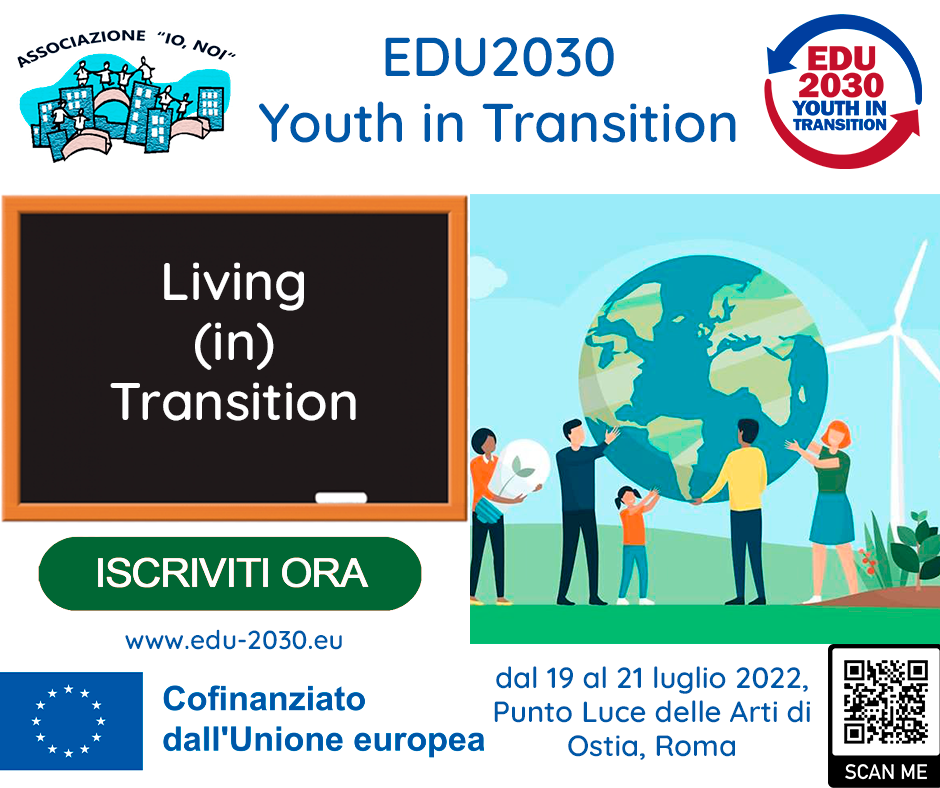
The Living (in) Transition LTT activity will be held in July 2022 in Italy, hosted by the project coordinator, Io, Noi – ODV.
It will last 3 full days of activity involving at least 21 participants (3 from each partner organization; the applicant will provide a higher number of local youth participants), and for sending organizations:
1 staff member -> with the profile of sustainability advisor – present or to be – within the organization;
1 youth worker -> with the profile of expertise in sustainability areas of competencies;
1 young people with fewer opportunities -> with the profile of already involvement or desired commitment in just and fair transition.
Training modules will include laboratories and non-formal methodologies to increase skills and knowledge in cross-sectorial sustainability, as well as to experience the emotional rewards associated with increased commitment for learning and sharing the Sustainable Development Goals among the countries involved. To do this, different methodologies will be used based on playing and activating participants through multi-channel languages (visual, written, virtual, sound etc.).
The LTT expected outcome of the activity is to test and validate the methodologies above mentioned with different participants in order to better design the virtual materials of the virtual courses that will be implemented. Specific goal is to empower the participants in being active agents for change in their local communities, also keeping a proper link with the project itself. In particular, we envision to achieve the following results:
For all target groups (participants + organizations):
- Better define a common framework and concrete vision about “just and fair transition” and how to contribute to its.
- Empower the self-recognition as key actors in promoting a more inclusive, peaceful, and greener society at local, national and EU level.
- For staff members:
- Improve their capacity of apply sustainability tools within the organizations and in designing all activities.
- For youth workers:
- Enhance their skills of working with a cross-sectorial sustainability approach.
- For young people with fewer opportunities:
- Support their capacity, passion and/or commitment in be active agents of change in communities.
In general Living (in) Transition LTT activity will contribute to the full achievement of the project’s objectives by reinforcing and enriching, with a participatory bottom-up approach, the consortium’s starting point of vision of a just and fair transition.
Specifically, by providing participants, in a proper transnational framework, with concrete tools to become agents of change in their communities the LTT will have a decisive impact in activating results for the following project objective: “establishing a transnational alliance between local communities of young people committed to be critical agents of change”. In fact, participants will be supported, even after the activity described here, to be the first nucleus of these glocal alliances.
Moreover but related, the multilevel capacity building included in this LTT activity will help the project objective “to contribute to mainstream the principle of sustainable development across policy making in the consortium’s countries”.
According to the expected outcome of the activity (to test and validate the methodologies above mentioned with different participants in order to better design the virtual materials of the virtual courses that will be implemented) the Living (in) Transition activity could also be considered a key step regarding the project objective: “providing innovative youth-led tools on Just and Fair Transition accessible for grassroot organizations”. Indeed, visualizing the further project result: Youth in Transition Massive Open Online Course, ongoing validation is necessary to ensure “competency-based training”, providing
concrete means to implement more advanced training modules.
To avoid the participants and further learners did not learn the intended subjected matter, this process of validation helps the organizations know specifically what type of additional training and mentoring may be needed to achieve the needed skills. In addition, it allows reflection and revision of the methodologies and training material itself to increase effectiveness.
A “competency” is a “skill performed to a specific standard under specific conditions”. 1 Competency based training defines specific skills to be learned in each training module, and then sets up methods to validate whether those specific skills were learned by participants. In other words, competency based training allows the facilitator to confirm that participants have the required knowledge and skills to do their jobs or take more advanced training.
The ongoing training validation method in presence is used directly within the training content, requiring only a few minutes of the facilitator’s time after each session to write notes of what was learned. It is the preferred validation method whenever possible, because it is not noticeable to participants as a “test” and therefore does not raise any anxiety among participants; and is more likely to get a true picture of competencies. However, because not always enough information about participant learning could be collected, after the activities the participants will be reached with other validation methods, virtually
designed.